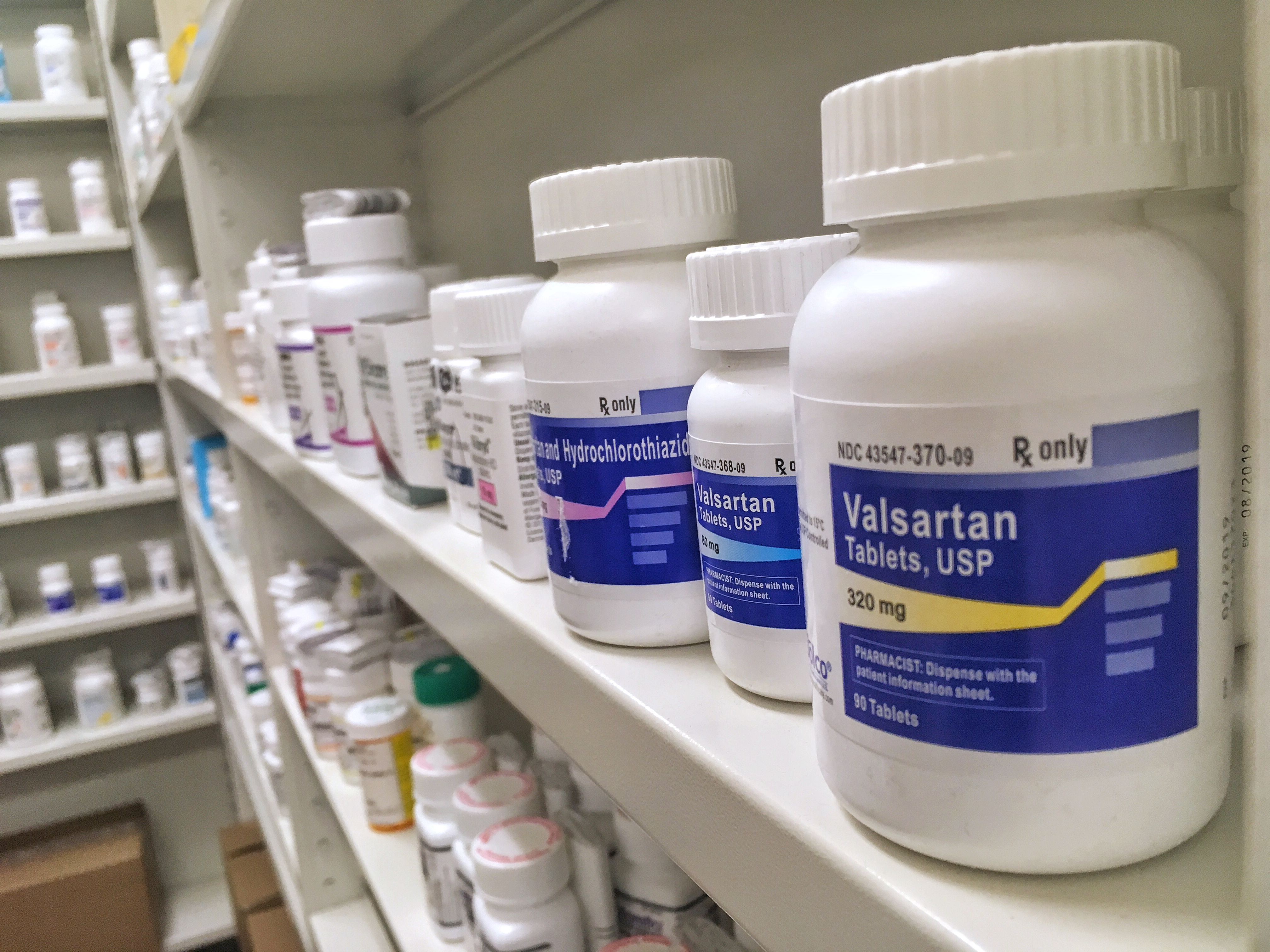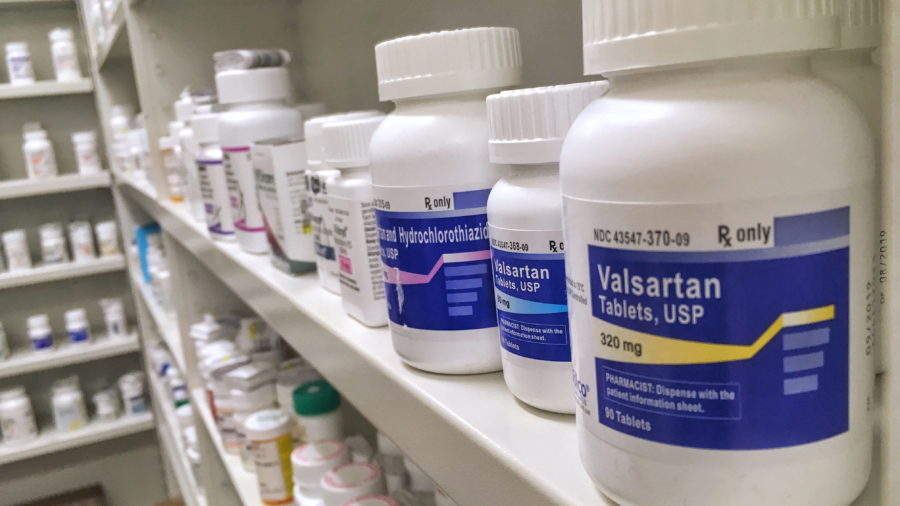The reason this blood pressure medication has been recalled, and the complications associated with it.
Written by Tracy R Everhart, MSN, MS CAM
Valsartan®
This medication is prescribed to individuals that have been diagnosed with high blood pressure (hypertension) and congestive heart failure. Valsartan® is part of a class of medication that are called Angiotensin II receptor blocker (ARB) and is available in several different forms. These include:
- Valsartan® tablets (40, 80, 160 and 320mg)
- Valsartan® and hydrochlorothiazide (HCTZ) tablets (80mg/12.5 mg, 160mg/12.5 mg, 160mg/25 mg, 320mg/12.5 mg, and 320mg/25 mg)
- Amlodipine and valsartan tablets (5mg/160mg, 5mg/320mg, 10mg/160mg and 10mg/320mg)
- Amlodipine, valsartan and hydrochlorothiazide tablets (5mg/160mg/12.5 mg, 5mg/160mg/25mg, 10mg/160mg/12.5mg, 10mg/160mg/25mg, and 10mg/320mg/25mg
Why has this drug been recalled?
In July 2018, the U.S. Food and Drug Administration (FDA) announced a voluntary recall of several medications that contained the active ingredient valsartan. The companies listed in this original release included Major Pharmaceuticals, Solco Healthcare and Teva Pharmaceuticals Industries, Inc. The FDA made it very clear at the time, that not all valsartan-containing medication sold in the U.S. were part of the recalled.
These products contained valsartan that was supplied to these manufacturers by Zhejiang Huahai Pharmaceuticals (Linhai, China) and were found to contain an impurity known as N-nitrosodimethylamine (NDMA). Patients were advised to contact their physician or pharmacy if they had any questions about the brand of Valsartan® that they were taking.
Based on laboratory studies, NDMA is classified as a likely human carcinogen (a substance that could cause cancer) and the Environmental Protection Agency (EPA) classifies NDMA as a probable human carcinogen and that exposure to high levels of NDMA may cause liver damage.
By the end of 2018, another carcinogen was found in samples that were recalled (N-Nitrosodiethylamine (NDEA)) and the number of recalled medications containing Valsartan® had increased so significantly that the FDA set up a webpage containing a list of those drugs. This list includes the manufacturer’s name, the drug, the dose, the lot numbers, and the expiration dates.

Carcinogenic effects of N-nitrosodimethylamine (NDMA) and N-Nitrosodiethylamine (NDEA)
Numerous studies conducted in the early 1990s indicated the carcinogenic effects of NDMA. During this time nitrates and nitrites were routinely used as food additives in processed meats such as ham, bacon, sausages, and hot dogs. These were added to prevent spoilage and preserve the appearance and flavor of these meat products. High consumption of processed meats has been shown to be linked to an increase in gastric cancer risk, and many researchers consider nitrates/nitrites as the main cause.
Nitrosamines are produced by chemical reactions of nitrates, nitrites and other proteins and (NDMA) is one of the most frequently occurring nitrosamines found in foods. NDMA is known to be a potent carcinogen. It is capable of inducing malignant tumors in different laboratory animal species. The cancer induced in these laboratory animals was seen in a variety of tissues, including liver, lung, and stomach.
Nitrosodiethylamine (NDEA) is classified by the Environmental Protection Agency (EPA) as a probable human carcinogen and has primarily been used in research studies of laboratory rats when it is necessary to induce liver cancer. The EPA fact sheet for NDEA states that chronic (long-term) exposure may cause liver damage and low platelet counts. They go on to say that animal studies suggest that chronic ingestion may cause liver tumors or other tumors, but the data of the carcinogenic effects of NDEA in humans are limited.
Impact on patients taking Valsartan®
- Since the discovery of NDMA and NDEA impurities in valsartan, the FDA recommended that those patients who were taking one of the affected drugs continue taking the medication until their physician or pharmacist provided an alternative medication or replaced it with a different brand. They continue to make this recommendation based on the fact that the risk of stopping the medication outweighs the risk of continued use.
It is unknown how the exposer to the different levels of these two carcinogens will affect the patients that took the various versions of this drug. However, the first case was filed in New York against manufacturers of these drugs and the pharmacies that dispensed them. The case, Duffy vs Prinston Pharmaceutical, Inc., Solco Healthcare U.S., L.L.C., Throggs Neck Pharmacy and Walgreen Co. (Walgreens) was filed on August 16, 2018, and on October 11, 2018, it was transferred to the United States District Court for the District of New Jersey.
This case (1:18-cv-07460-RJS) has been filed as a class action lawsuit, sighting that the manufacturers of the recalled drugs produced and distributed a generic version of valsartan that contained carcinogenic impurities and that these impurities went undetected for six years. The filing states that this case seeks equitable relief and to recover damages and restitution for:
- Breach of express warranty,
- Breach of the implied warranty of merchantability,
- Violation of New York’s General Business Law §§ 349, 350 (Consumer Protection From Deceptive Acts and Practices),
- Unjust enrichment,
- Fraudulent concealment,
- Fraud,
- Conversion,
- Strict products liability
- Gross negligence,
- Negligence, and
- Battery
The plaintiffs, in this case, were prescribed valsartan for an extended period of time and each time that they refilled their prescriptions, they received information about the medication, including “representations and warranties that the medication was properly manufactured and free from contaminants and defects”. They also received notification via U.S. Mail advising him that the valsartan-containing medication that they were taking was affected by the recall. It is unknown at this time how many manufacturers have produced contaminated valsartan as the list continues to grow. It is also unknown how many individuals will be affected by these carcinogenic impurities.
Sources:
https://www.fda.gov/downloads/Drugs/DrugSafety/UCM615703.pdf
https://www.fda.gov/NewsEvents/Newsroom/PressAnnouncements/ucm613532.htm
https://www.mdpi.com/2072-6643/7/12/5505/htm#B10-nutrients-07-05505
https://www.sciencedirect.com/science/article/abs/pii/0165121891901234
https://www.tci-thaijo.org/index.php/vis/article/view/124770
https://www.epa.gov/sites/production/files/2016-09/documents/n-nitrosodimethylamine.pdf
https://dockets.justia.com/docket/new-york/nysdce/1:2018cv07460/499403
https://law.justia.com/codes/new-york/2013/gbs/article-22-a/

Tracy R Everhart, MSN, MS CAM
For more than 20 years I've had the opportunity to work in numerous rolls within the medical field, including the last 7 years as a professional medical writer. With an undergraduate degree in biology/microbiology, postgraduate education in allopathic and complementary alternative medicine, my education has afforded me career opportunities with direct patient care, medical research and clinical oversight of statewide projects to improve the health of patients of all ages. I have a broad and deep knowledge of illnesses and conditions that can affect the human body. Even more important is that I have learned traditional treatment methodologies combined with alternative forms, to make the most informed decision about options that may be available.

Get A Free Valsartan Case Review
If you or your loved one took valsartan contaminated with NDMA, Fill out the form and get a free case review.


